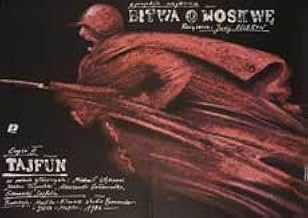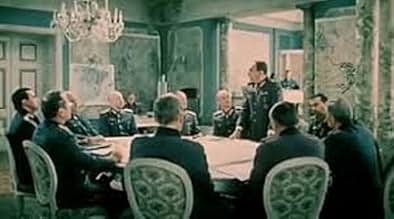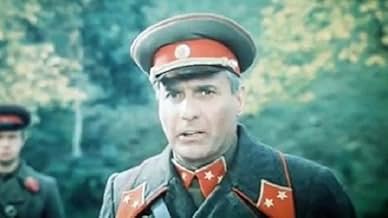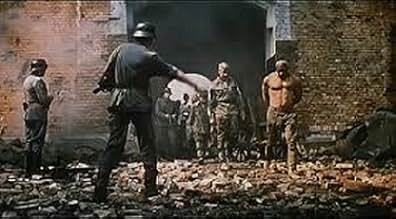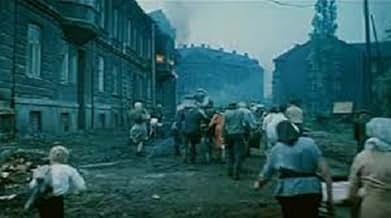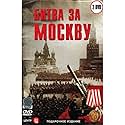A batalha de Moscou foi a primeira grande derrota da Wehrmacht alemã na Segunda Guerra Mundial. O filme é dedicado a alguns eventos de combate que ocorreram na URSS após a conquista da Europ... Ler tudoA batalha de Moscou foi a primeira grande derrota da Wehrmacht alemã na Segunda Guerra Mundial. O filme é dedicado a alguns eventos de combate que ocorreram na URSS após a conquista da Europa Ocidental por Hitler.A batalha de Moscou foi a primeira grande derrota da Wehrmacht alemã na Segunda Guerra Mundial. O filme é dedicado a alguns eventos de combate que ocorreram na URSS após a conquista da Europa Ocidental por Hitler.
Explorar episódios
Enredo
Você sabia?
- CuriosidadesIn Vietnam, with the help of cinematographers from the FAFIM Vietnam studio, several scenes were shot for the film, recreating the atmosphere of the Japanese capital in the early 1940s and episodes of the work of the Soviet intelligence officer Richard Sorge in Tokyo.
- Erros de gravaçãoShells can be seen exploding over battlefields. Timed shells were seldom if ever used for this purpose in the Second World War.
- ConexõesFeatured in Legendy mirovogo kino: Yury Ozerov
Avaliação em destaque
It has been 70 years since the Second World War began to be felt in the Soviet Union, and almost hit its great capital of Moscow.
In 1985, in time for the ruby jubilee of the final Allied victory in Europe and the 20th anniversary of Moscow's proclamation as a Hero City of the Soviet Union, the two episode movie series Battle of Moscow debuted in theaters across the USSR. Yuri Ozerov sure made Muscovites proud since he had at last made a great movie about the first days of the war, and the battles for the defense of Brest Fortress, of Kiev and of Russia's greatest city and capital, Moscow.
The first episode chronicles the beginning of the war on June 22, 1941 and of the bravery and valor shown by the Red Army in the Brest Fortess, Yelnya and Kiev. The second episode is focused on the battles for Moscow itself. The best parts of it is the November 7 parade at Red Square where Yakov Tripolski reminds us of Joseph Stalin's address to the Soviet people and armed forces telling them to fight bravery against the German fascists, how Zoya Kosmodemyanskaya (acted well here by Irina Shemliova) became a heroine partisan and later posthumously became the 1st lady partisan Hero of the Soviet Union, and of the heroism of the 8th Rifle Division led by its commander Ivan Panfilov (Konstanin Stepankov) and its political commissar acted here by Aleksandr Voevodin against the German Army, and later documents the later counterattack led by General of the Army Georgy Zhukov (Mikhail Ulyanov) of the entire Red Army and Red Air Forces, composed of military academy and school cadets, cavalry forces including that of the 2nd Guards Cavalry Corps commanded by General Lev Dovator (Lev Pregunov), citizen partisans, regular infantry and Siberian riflemen and ski soldiers aided by fighters, interceptors, attack aircraft and bombers of the Red Air Forces and the Red Army Air Defense Forces, plus artillery and the armored and motorized infantry units.
The end scenes of part 2 of the 2nd episode with a montage of Moscow 44 years after that battle set to the movie theme song by Aleksandra Pakhmutova and Nikolai Dobronranov and sung perfectly by Lev Leshchenko truly gets me every time, for this reminds us of the many lives lost in the city's defense. And speaking of the musical score, it was also great and fitting to the action (although it was mostly shot at Moscow and in Czechoslovakia, most especially the battle scenes, and some scenes were shot in Vietnam).
Indeed, 70 years have passed, but the spirit of Moscow's defenders who showed the world how to fight against the forces of fascism truly live on in our hearts. Moscow is truly indeed a Hero City of Russia and the battles for it an example of the brute force and effects of all-out war against the forces of evil.
Eternal glory to all these brave defenders of Moscow, who died for us to live in freedom and peace, and gave us a free and great world on which we stand against evil. I'll always think of them everyday and when I soon go to Moscow's Eternal Flame... I'll remember them all.
In 1985, in time for the ruby jubilee of the final Allied victory in Europe and the 20th anniversary of Moscow's proclamation as a Hero City of the Soviet Union, the two episode movie series Battle of Moscow debuted in theaters across the USSR. Yuri Ozerov sure made Muscovites proud since he had at last made a great movie about the first days of the war, and the battles for the defense of Brest Fortress, of Kiev and of Russia's greatest city and capital, Moscow.
The first episode chronicles the beginning of the war on June 22, 1941 and of the bravery and valor shown by the Red Army in the Brest Fortess, Yelnya and Kiev. The second episode is focused on the battles for Moscow itself. The best parts of it is the November 7 parade at Red Square where Yakov Tripolski reminds us of Joseph Stalin's address to the Soviet people and armed forces telling them to fight bravery against the German fascists, how Zoya Kosmodemyanskaya (acted well here by Irina Shemliova) became a heroine partisan and later posthumously became the 1st lady partisan Hero of the Soviet Union, and of the heroism of the 8th Rifle Division led by its commander Ivan Panfilov (Konstanin Stepankov) and its political commissar acted here by Aleksandr Voevodin against the German Army, and later documents the later counterattack led by General of the Army Georgy Zhukov (Mikhail Ulyanov) of the entire Red Army and Red Air Forces, composed of military academy and school cadets, cavalry forces including that of the 2nd Guards Cavalry Corps commanded by General Lev Dovator (Lev Pregunov), citizen partisans, regular infantry and Siberian riflemen and ski soldiers aided by fighters, interceptors, attack aircraft and bombers of the Red Air Forces and the Red Army Air Defense Forces, plus artillery and the armored and motorized infantry units.
The end scenes of part 2 of the 2nd episode with a montage of Moscow 44 years after that battle set to the movie theme song by Aleksandra Pakhmutova and Nikolai Dobronranov and sung perfectly by Lev Leshchenko truly gets me every time, for this reminds us of the many lives lost in the city's defense. And speaking of the musical score, it was also great and fitting to the action (although it was mostly shot at Moscow and in Czechoslovakia, most especially the battle scenes, and some scenes were shot in Vietnam).
Indeed, 70 years have passed, but the spirit of Moscow's defenders who showed the world how to fight against the forces of fascism truly live on in our hearts. Moscow is truly indeed a Hero City of Russia and the battles for it an example of the brute force and effects of all-out war against the forces of evil.
Eternal glory to all these brave defenders of Moscow, who died for us to live in freedom and peace, and gave us a free and great world on which we stand against evil. I'll always think of them everyday and when I soon go to Moscow's Eternal Flame... I'll remember them all.
- jmramos0109
- 13 de out. de 2011
- Link permanente
Principais escolhas
Faça login para avaliar e ver a lista de recomendações personalizadas
Detalhes
- Data de lançamento
- Países de origem
- Idiomas
- Também conhecido como
- Битва за Москву
- Locações de filme
- Novosibirsk, Novosibirskaya Oblast, Rússia(battle scenes)
- Empresas de produção
- Consulte mais créditos da empresa na IMDbPro
- Tempo de duração5 horas 58 minutos
- Cor
- Proporção
- 2.35 : 1
Contribua para esta página
Sugerir uma alteração ou adicionar conteúdo ausente

Principal brecha
By what name was Bitva za Moskvu (1985) officially released in Canada in English?
Responda
